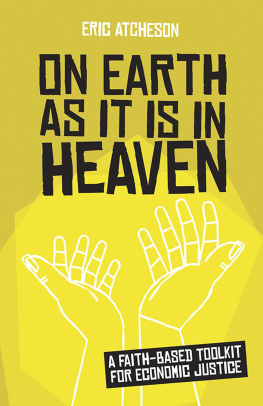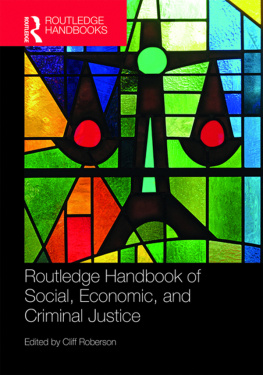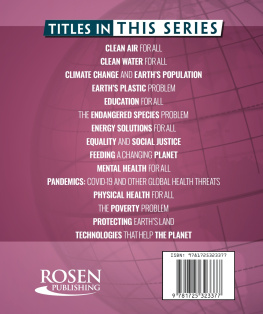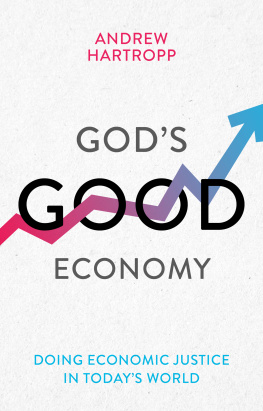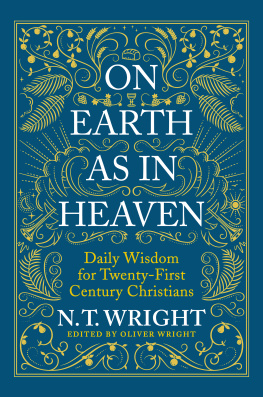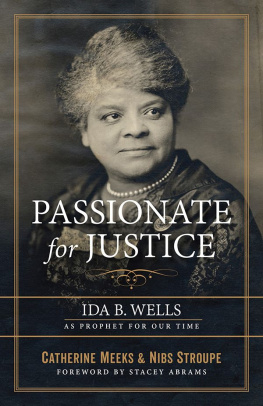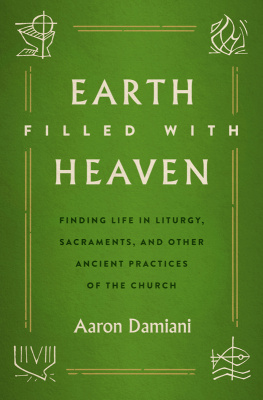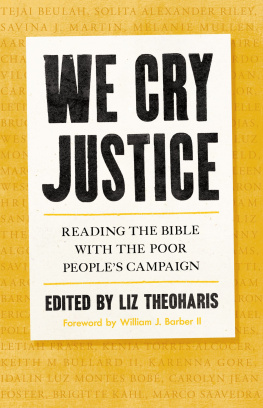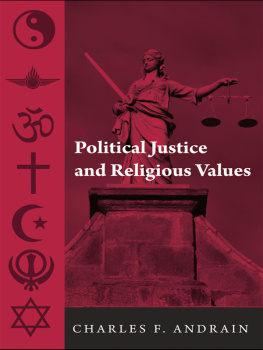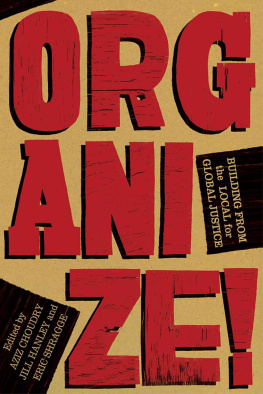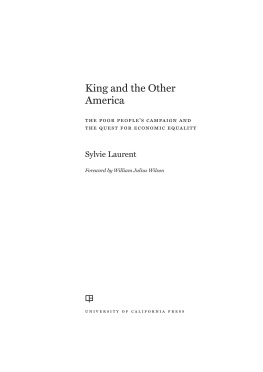ON EARTH AS IT IS IN HEAVEN

Copyright 2020 by Eric Atcheson
All rights reserved. No part of this book may be reproduced, stored in a retrieval system, or transmitted in any form or by any means, electronic or mechanical, including photocopying, recording, or otherwise, without the written permission of the publisher.
Unless otherwise noted, the Scripture quotations are from the Common English Bible. All rights reserved. No part of these materials may be reproduced or transmitted in any form or by any means, electronic or mechanical, including photocopying and recording, or by any information storage or retrieval system, except as may be expressly permitted by the 1976 Copyright Act, the 1998 Digital Millennium Copyright Act, or in writing from the publisher.
Church Publishing
19 East 34th Street
New York, NY 10016
www.churchpublishing.org
Cover design by Paul Soupiset
Typeset by Denise Hoff
Library of Congress Cataloging-in-Publication Data
Names: Atcheson, Eric, author.
Title: On earth as it is in heaven : a faith-based toolkit for economic justice / Eric Atcheson.
Identifiers: LCCN 2019048951 (print) | LCCN 2019048952 (ebook) | ISBN 9781640652262 (paperback) | ISBN 9781640652279 (epub)
Subjects: LCSH: Economics--Religious aspects--Christianity. | Social justice--Religious aspects--Christianity.
Classification: LCC BR115.E3 A83 2020 (print) | LCC BR115.E3 (ebook) | DDC 261.8/5--dc23
LC record available at https://lccn.loc.gov/2019048951
LC ebook record available at https://lccn.loc.gov/2019048952
For Carrie, who is my love in every possible
and impossible sense.
For Sadie, who is my hope made flesh.
The love of generations is always at your back, my child.
And always, as my Jesuit alma mater would say,
for the greater glory of God. Ad maiorem Dei gloriam.
My committee had just read over the first full draft of my doctoral thesis, and one of the members was intensely curious. Why did I title my project For More than Ashes?
I pointed toward the verse in Jeremiah where the prophet says that God has proclaimed, People labor in vain; nations toil for nothing but ashes (51:58).
He responded, You need to make clear that verses importance to you.
So, I did. You are holding the fruits of that years-long effort right now.
This book is inspired by my work as a doctor of ministry student at Seattle Universitys School of Theology and Ministry, where I wrote my thesis on a pair of labor union strikes that took place almost simultaneously in the late summer of 2015 in southwestern Washington State. At the time, I was pastoring a historic Disciples of Christ congregation in the area. Across Washington, public schoolteachers were going on strike in protest of the drastic privations imposed on them by a state legislature so dysfunctional that the state supreme court had held it in contempt for not approving a budget that passed constitutional muster the year prior. Locally, the teachers who worked for the Kelso School District and were members of the Kelso Education Association labor union were among those who went on strike during those waves of protest.
Meanwhile, the millworkers at the pulp and paper mill owned by KapStone in Longview, across the Coweeman River from Kelso, had been laboring without a collective bargaining agreement for months, despite a series of protracted, on-and-off negotiations between KapStone and the Association of Western Pulp and Paper Workers Local 153. After working without a contract since May 2014, the members of AWPPW Local 153 went out on strike in 2015. It was the first time that Local 153 had done so in over thirty-five years, and they remained on strike for twelve days.
The close geographic and chronological proximity of both strikes shook the community in and around my former parish. I had congregants whose households were picketing and living on strike pay, and others (myself included) who attended rallies in solidarity with the teachers and millworkers. All around town, signs of support for the striking workers went up in the windows of homes and local businesses.
Beneath the outward signs of support, however, rumbled a genuine backlash toward the teachers, millworkers, and those who supported them. Furious letters were written to the editor of the local paper, The Daily News, denouncing the strikes. I began to receive unsigned hate mail at my church office. The striking workers still felt fear, stress, and trepidation as they took the leap of faith and courage to go on strike.
I know that because they told me so. In the autumn of 2017, just over two years after the strikes, I spent two months surveying union members who were also active in local congregations about their memories and feelings of the strikes and what they felt the church and the clergy could or should be doing to support them and help spiritually prepare them for the hardship of organizing and striking. I also surveyed those workers pastors to also ask them about their own memories of the strikes and their beliefs about how the church should respond.
What the union members had to say surprised and inspired me. Their memories of the strikes were vivid and heartfelt, as they spoke lovingly of the support they received as well as forthrightly about the worries they felt. Mostthough not allof them felt that the church had some role to play in the community during a strike. Even though they did not agree on what that role should look like, they did largely agree that they did not want the church, or their pastors, to simply pretend the strikes were not happening and that it was business as usual in their parishes. Most of all, the workers and pastors I polled expressed a necessity for the church to spiritually equip its congregants to encourage truth-telling, engagement, and dialogue over matters of labor and Christian spirituality the next time a labor action took place in their community.
That expressed need is what this book represents my attempt to meet: a need to equip laypeople and clergy alike with tools for truth-telling, fostering dialogue, and encouraging engagement with Christian social teaching about work. An integral part of this toolkit is an exploration of all of the benefits that it should confer: dignity, financial security, and a sense of pride in the fruits of ones own labors.
I have come by the desire and gumption to write this book the long way around. I spent nearly seven years embedded as a pastor in a community that had long relied on labor unions to protect the economic interests of its citizens, only for the unions to be decimated over decades of corporate indifference to the plights of poverty and financial insecurity in the area. Before my tenure as the pastor of First Christian Church in Longview, I lived and studied in the San Francisco Bay Area, which was rocked by the threat of a Bay Area Rapid Transit (BART) workers strike in the summer of 2009. And as a boy, I was raised on the lessons of the gains organized workers had made for society by a father who worked as a lawyer for a firm that served Kansas City area labor unions before eventually being appointed as a state appellate judge.
I hope and pray that the passion of a life surrounded by the need for the poor and the workers to labor together for a better world shines through in these pages. I have come to believe that this sort of passion is what is required of the churchand, more broadly, of justice-minded people across the religious spectrumto meaningfully change the economy we have constructed for ourselves over the past forty-some years in which the wealthy get wealthier while the rest of humanity simply survivesor does not survive.

